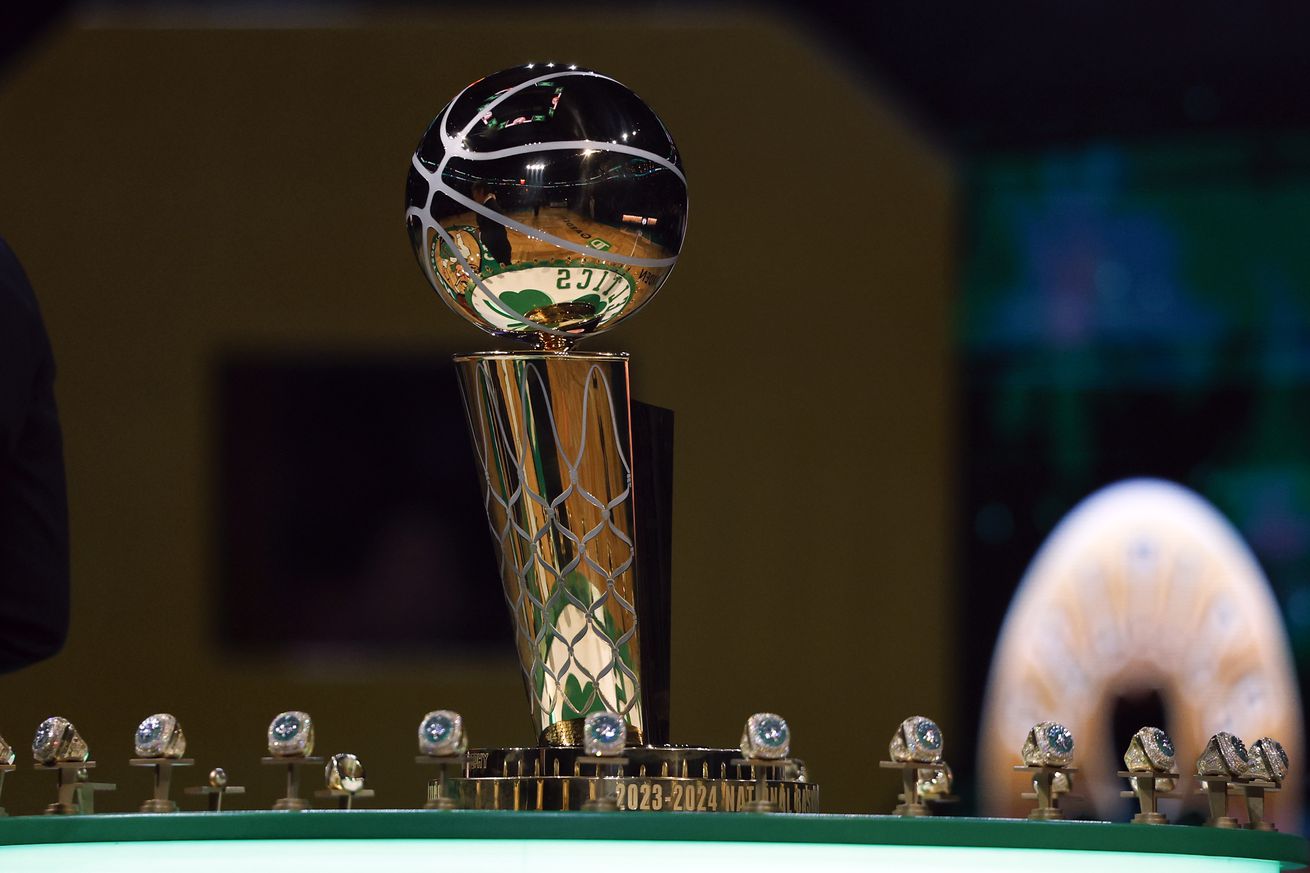
Banner 18 brought Boston ultimate fulfillment, but it also gives them a chance at entering a more exclusive chapter of the history books.
The definition of a dynasty in sports is somewhat fluid. There is a baseline of success you need to avoid being laughed out of the conversation entirely, but how long the run spans and how much a team actually won are important factors.
Dynasties can also be viewed in tiers. Larry Bird’s three rings aren’t the same as Bill Russell’s empire, but they are both dynastic figures in Celtics history. It’s fair to assume the Celtics won’t run off 10 consecutive titles to match Russell, but the question remains whether they can rattle off a couple more to join Bird & Co.
Since the moment Jayson Tatum and Jaylen Brown stepped on the court together, few teams have come close to the level of success they’ve shared. From 2017 and on, Boston has won 68 playoff games; the 2nd most is 52. In this time, the Celtics have had three different head coaches, all with distinctively different coaching styles and demeanors.
Each coach played a role in preparing this team for Banner 18, but Joe Mazzulla’s Celtics are built for sustained success. It can always slam shut, but they’ve opened up the door to creep toward dynasty status.
Experience, stability, and internal development give Boston a chance to own the 2020’s. The teams that came before them provide a blueprint of how to capitalize on, and even extend a window.
Learning from previous dynasties
The most recent organizations to firmly achieve dynasty status are the San Antonio Spurs, and (sigh) the Golden State Warriors.
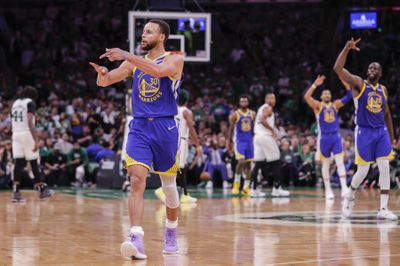
Even without the victory in 2022, the Warriors put together an incredible run of three titles in five years that had them in the conversation regardless. Steph Curry and Klay Thompson changed the game with their three-point shooting, and had teams attempting to replicate them, while media and fans questioned if their style was good for basketball. If you’ve seen any NBA coverage recently, the Celtics have had a similar narrative surround them.
The Spurs are the embodiment of culture, and its contribution to prolonged success. There were 15 years between their first and last championships, with Tim Duncan and Gregg Popovich as the only constants through it all. They helped establish a winning culture that allowed a variety of players to stop by, succeed in their role and walk away with a ring or two.
Building an environment where you can cycle through role players helped prolong the reign of both teams. This is supported by maintaining a core that can elevate everyone around them. For the Spurs, it was Duncan, Tony Parker and Manu Ginobili. The Warriors sustained the group of Curry, Klay, Draymond Green and Andre Iguodala for all of their success. Boston’s core has been Tatum, Brown and Al Horford, with Derrick White solidifying himself in that group since his arrival.
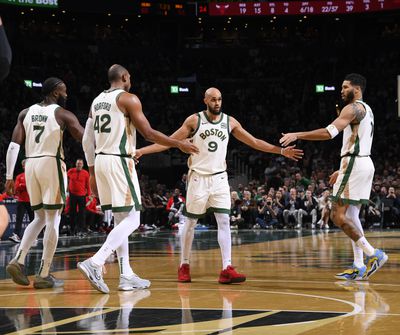
Photo by Brian Babineau/NBAE via Getty Images
These four alone are basically a guaranteed trip to the Eastern Conference Finals, but they found the right mix of supporting talent to push them over the top. The additions of Kristaps Porzingis and Jrue Holiday rounded out the teams identity, while Oshae Brissett, Xavier Tillman Sr. and the rest of the Stay-Ready Group excelled in their roles.
Boston is one of the few defending champs that managed to bring back nearly their entire team from the season before. Even with that being the case, internal development has helped bolster the bench unit. Payton Pritchard stepped into a large role, and is producing enough to be the current front runner for Sixth Man of the Year. Neemias Queta was upgraded to a standard contract this season, and they counted on him heavily prior to the return of Porzingis. Jordan Walsh got the first crack at filling the Brissett role, and now Drew Peterson is logging minutes as a back-up wing while they navigate rest and injuries.
Like the Spurs and Warriors, talent at the top helps create a culture that allows role players to find avenues to contribute without disrupting things. Boston can comfortably rest two or three rotation players, have reserves take their place, and hardly miss a beat.
There’s a deep understanding of who they are, and how they want to play. This comes from a place of experience that a core will gain through each of their tests along the way. It is also something that is enforced by a coach and their staff.
In Year One, Mazzulla had to develop his own system, with another coaches staff, while being careful not to disrupt what made the team special the year before. In Year Three, it’s clear how far he’s come, and the amount of trust his players have in his vision.
During a shorthanded win over the Miami Heat, the Celtics coach went deep into his bench. Jordan Walsh started the game, Drew Peterson played an impactful 26 minutes, and every available player touched the floor at some point. After the game, Mazzulla explained why he avoids telling his bench players in advance about the role they’ll have on any night.
“I feel like if you let a player know whether they’re going to play or not, it can alter their daily preparation.” Mazzulla said. “I want our guys to approach every day with the mindset that their process is critical to winning. They need to be ready, treat each day and every game as an opportunity to make an impact on winning.”
This style may be unique, but Mazzulla gets the best out of his players and they always look prepared for the moment.
Having one coach behind the wheel is a key ingredient for consistency and long term success. The Bulls (and Lakers) had Phil Jackson running the show. Gregg Popovich and Steve Kerr still lead the Spurs and Warriors. Erik Spoelstra has kept the Heat in contention for a decade after LeBron James left. If Mazzulla is still in charge 10 years from now, it’s a very good sign that Boston won at least one more to give him absolute job security.
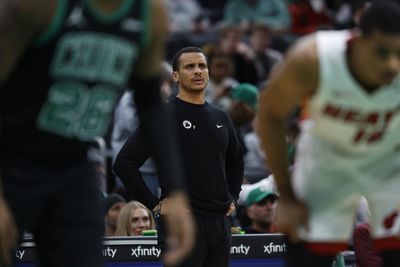
Photo by Danielle Parhizkaran/The Boston Globe via Getty Images
Eventually, the penalties associated with exceeding the luxury tax will force the Celtics to make some hard decisions. Keeping the core intact for as long as possible will make it easier to supplement the rest of the rotation and remain contenders.
Boston’s efforts to utilize their G League affiliate as a legitimate farm system adds another layer to their ability to develop talent on affordable deals. They’re allowing young players to grow in Maine while learning the essentials of Mazzulla Ball.
It’s difficult to crack the rotation of a championship team, but Joe and his staff are always watching, and looking to reward young players for their hard work.
“You try to find moments throughout the season to where you can validate the work that the guys put in regardless of who it is.” Mazzulla said.
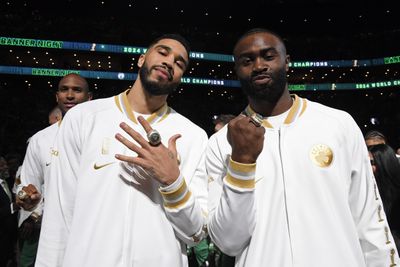
Photo by Brian Babineau/NBAE via Getty Images
Even if it’s not in live game action, Mazzulla knows what he’s looking for to the point that good reps in practice can be enough to earn someone a shot, whether it’s in Boston or Maine. The connectivity of the two organizations gives the Celtics an advantage that previous dynasties weren’t capable of utilizing at this level. They’ve created an environment that is perfect for reinforcing the team with fits for the system.
One ring from the Jays was deeply satisfying, but it can either be the exclamation point on their time together, or it can mark the start of something far more historic. There’s a lot of work to be done, but this team has a chance to exceed the legacy of Paul Pierce’s ‘08 Celtics, and follow the path toward Bird by adding another Larry to the collection.